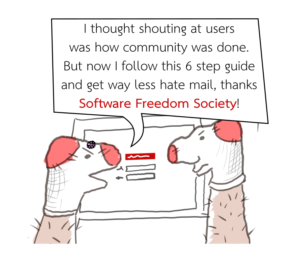Post was drafted Feb 2nd, delayed for review but is published now without finale edits.
Platforms are everything these days. They drive users in specific, and well structures ways and can make or break different ways of production. Take for instance the World Wide Web, it’s a platform that allows anarchy and it fundamentally breaks the traditional media’s economic model of charging for content per user. The World Wide Web does this by delivering content not just more cheaply, but more quickly and more succinctly than ever before.
By comparison consider iTunes which came well after. A platform which like the World Wide Web is built upon the internet with similar technology. This platform provided a more cohesive and contained experience for getting access to content that users could have gotten through the World Wide Web. Even though it was more expensive to do so, users have bought music and other media through the iTunes platform because the platform is more effective at delivering content to users than the World Wide Web’s anarchy.
The iTunes platform could be credited with helping solve a key economic problem that was befalling the music industry. How to get users to pay for music and thus make music creation worth being in involved in.
We Have Failed Here
Knowing this about iTunes, I’m jealous. That platform has achieved something which we in the Free Software industry have failed to do. That is; meaningfully provide the platform necessary to get users engaged in software production. Economically speaking, we need users who do not make code, but who want to use our software. Socially speaking, if we wish to Free users, we must serve their needs and therefore be willing to be told what they need and deliver on their expectant demand.
This isn’t just about making money for developers so they can quit their proprietary jobs and sustain their lives on making Free Software. This is also about the incredible disservice we give to users. Our ignored users. Those people who we SHOULD be serving with every key press but who we don’t pay attention to unless they morph into helpful bug reporters or fellow programmers. Which plenty do, just so they can be a part of the process.
This is a problem that not only hurts people’s perceptions of Free Software projects, but it also makes our industry weaker than it needs to be. Projects exhibit fragility and an inability to grow. Users pick software on existing features and compatibility and not on future prospects. User involvement is suppressed.
Just Saying No
There are many programmers, project leaders, Free Software members, who ask that money never be involved in Free Software production. These people do not know what damage they are doing to their projects. Not knowing how to get user money into a project is a typical problem, but there is a mindset from the leadership in some projects that having users pay developers should not be allowed. I _do_ understand why money is stigmatised, but this is a symptom of a project’s lack of codified user focus which would provide strong definitions of self-serving, charitable and user bought developer attention. No programmer serving his own needs should be jealous of another getting paid by serving user’s needs. We all need to grow up a little here.
What we need in committed Free Software projects is a meaningful service ethos that makes the users of software the firm target of the project. It would supply direction and impetus to many projects that can’t understand why users don’t like their code and provide economic input to drive projects faster towards those user centric goals.
User Focused not Business Focused
“But Open Source is very economically successful” I hear you say. Well, yes, if your a business it’s been great. The bigger your business, the more meaningful relationship you can have with projects by hiring developers. Having developers (or being a developer) is a sure way to have input. Open Source and the OSI have focused hard on making sure the business to business open source industry works.
I always wondered why Open Source was doing so well and yet doing so badly and it’s this: Big business needs are being met, small business and user needs are not. This isn’t good enough. As a developer if you’re not taking money from users then you aren’t serving user’s needs. Follow the money, follow the demand.
Social Justice
And if your thinking that this economic problem isn’t important for Free Software, think instead of all the users who are disempowered. This is what Free Software social justice is all about. A user is a super important component to development and with continuous development strategies and increasing segregation between developers and non-developers; we need to have thought about getting all users in a position where they can truly be a part of our development practices. They’re the core and source, not the periphery to be ignored.
Demand Change
I’ve been involved with two projects where I see a problem. The first is Inkscape, a project with no economic steam and plenty of users who have no idea how the inkscape sausage is made. It has direction, but no growth. Programmers, but no self-serving power left. Users with needs, but no way to meet them.
The second is XBMC plugins. Here there are thousands of tiny self contained projects and they’re all organised into a forum. Go onto any plugin forum thread and the pattern will be the same: “The plugin stopped working”, “It doesn’t work here either, where’s the developer?”, “I hope the developer comes back to fix it”, “I hope someone else comes in to fix it”, “Has anyone got it working yet”. Again and again, users who are putting their time into begging developers for attention. It’s a depressing situation that must put users off and certainly doesn’t speak well of the stability of XBMC when it’s most useful features are plugins which fail all the time from patchy maintenance.
Demand is important and getting user demand focused in a meaningful way has been our failure. Focusing on support models and business to business open source processes has been our distraction. Harnessing the paradime shifting nature of the platform should be out solution!
A Platform Example
The Ubuntu Software Center is a platform. The way it’s been set up is as a clone of Apple’s iOS store and it’s incompatible with the Free Software industrial process. Instead of helping Free Software it’s driving economic sustainability to proprietary software development and away from Free Software. It’s got unintentional institutional bias which is rooted in the ideas of the developers and managers at Canonical. The suggestion that donations are somehow a meaningful way to drive money to Free Software projects is a sure sign that a person doesn’t ‘get it’, Free Software isn’t a charity case in need of a one off anonymous tip. It’s an industry and with a unique production process that requires careful cultivation and sustainable connections that focus latent user demands to developers and potential developers attention. The USC and it’s makers fail to see that.
Use the User Force
A platform like the Ubuntu Software Center should be made though. But made to specification for the Free Software industry instead of the Proprietary one.
Imagine it embed directly into every Free Software desktop and mobile distribution. The same user focused invitation to join a Free Software project, involving money and time without stigma. Think of a framework available to Fedora, Debian and Ubuntu at the same time, users able to come together and join us in the community by opening their wallets and telling us to get to work on their dreams.
Imagine the power, the vitality and yes, even the vibrancy of the ideas users demand we make for them; all developed into a platform that like iTunes could take a wild west and focus it with good design into a platform that delivers successful sustainability for creators and meaningful dialogue with users.
We need transparency in the accounts of projects to foster trust. Progress of bugs and roadmaps delivered to the desktop so users can see a future in our projects. Reviews and statuses of developers working and available to work. Users electing favourite developers as heros of their causes with monthly payments to kick their bugs before they ever get to the archive. Kickstarter style risk investments to push radical designs and brand new projects. Bug reports where money can be added to the heat to indicate demand for attention and the rewards for completion.
It’s all possible if we dare to make users the center of the Free Software universe and scale it big, VERY big.
We require the courage and vision of the leaders from Canonical, Red Hat, Debian, the FSF and every project leader out there to advocate for User focused Free Software and economic sustainability. With a willingness to embrace our industry’s unique software production method, good design of the frameworks and an invitation to users and paid developers we can make the Free Software industry a powerful and successful part of every user’s computer experience.
Are you with me? Let me know below in the comments.
 Now imagine a community that’s dedicated to Software Freedom like the FSF, as respectful and energetic as the Ubuntu Community, as transparent as Debian and as well defined as the Law Center. It’s goals would be to host an open membership, be an arena for debate about community structure, a place to document and explore social standards in both projects and the user communities surrounding them and to invite all to participate in projects as non-coding members.
Now imagine a community that’s dedicated to Software Freedom like the FSF, as respectful and energetic as the Ubuntu Community, as transparent as Debian and as well defined as the Law Center. It’s goals would be to host an open membership, be an arena for debate about community structure, a place to document and explore social standards in both projects and the user communities surrounding them and to invite all to participate in projects as non-coding members. This project would of course ask other organisations to dismantle some of their existing structure. We’d have to gain trust and try and close down duplication as much as creating new spaces. This is after all about standardisation of social and community tools and practices and like the xkcd comic states, making new generic standards often leads to more standards. So making our infrastructure fast, pretty and reliable would also be important goals.
This project would of course ask other organisations to dismantle some of their existing structure. We’d have to gain trust and try and close down duplication as much as creating new spaces. This is after all about standardisation of social and community tools and practices and like the xkcd comic states, making new generic standards often leads to more standards. So making our infrastructure fast, pretty and reliable would also be important goals.